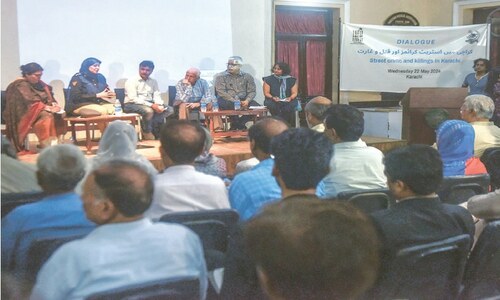WE know that the English words and phrases that have their origin in the Indo-Pak subcontinent abound, as works like ‘Hobson-Jobson’ and ‘An Anglo-Indian Dictionary’ have listed hundreds of them — or even more.
But some of them are quite bizarre and even experts in the field could not precisely tell where they have come from. One of the expressions that defies all etymological research is ‘gymkhana’.
Karachi Gymkhana may have a long history and its members may take pride in it, but they, and we as well, may not say for sure where the word has come from. Apparently, a portmanteau of the English word ‘gym’ (short form of gymnasium) and the Persian ‘khana’ (house), the word gymkhana has been an enigma for lexicographers and linguists.
An Urdu-Urdu dictionary Noor-ul-Lughaat (1924), for instance, mentions that gymkhana’s origin is ‘game’ khana, but it seems highly unlikely. ‘Hobson-Jobson’ (1886) says “this word is quite modern and was unknown 40 years ago. The first use that we can trace is ... at Rurki in 1861, when a gymkhana was instituted there. It is a factitious word invented, we believe, in the Bombay Presidency, and probably based upon ‘gend-khana’ (the ball-house), the name usually given in Hind[ustan] to an English racket-court” (page 406-407). It adds that at gymkhana “facilities for athletics and games” are provided.
If the word gymkhana’s origin is ‘gendkhana’ and ‘gend’ means ‘ball’ in Hindi and Urdu, it is a ‘ball house’. Sounds fine as it carries the clue to the modern meaning that gymkhana has: “an event in which people riding horses take part in various competitions”, as put by Oxford Advanced Learner’s Dictionary. Also, Concise Oxford English Dictionary (COED) says gymkhana is ‘public place with facilities for athletics; athletic-sports display’, (the first edition, 1911). So ‘gend’ plus ‘khana’ apparently makes sense, but COED seems confused about the origin of gymkhana and mentions “gym (nastics)” as well as “(gend-)khana”.
But for etymology, Hobson-Jobson says the gym may have been simply a corruption of ‘gend’ shaped by gymnastics”. Here one has to scratch one’s head as there is no way in which the word ‘gend’ might have been shaped by ‘gymnastics’, since John T. Platts in his ‘Dictionary of Urdu, Classical Hindi and English’ has mentioned that the word ‘gend’ has its origin in Sanskrit or Prakrit, whereas ‘gymnastics’ has its roots in Greek. Hobson-Jobson also refutes the impression that the word gymkhana was originated in Persia and Hindustan from the phrase jama’at khana, or ‘a place of assemblage’. It is interesting to note that the word jama’at khana is used for the place of assemblage or place of worship by some communities in India and Pakistan, such as Bohras and Ismailis.
Two other dictionaries that enlist Anglo-Indian words agree with Hobson-Jobson. One is named ‘An Anglo-Indian Dictionary’. Compiled by George Clifford Whitworth and published from London in 1885, it sounds more careful and says about gymkhana “the origin of this Anglo-Indian word is unknown ... the first syllable is often said to stand for the word gymnasium, but it is difficult to see how such a combination could have come into popular use. A gymkhana in Western India is a club for all kinds of sports and ... in Northern India the name is given rather to a particular celebration of sports”.
But the origin of the word gymkhana remains a mystery.
Another such word is kanjee house.
In Urdu, kanjee house or conjee house or congee house means a place where stray animals are kept, albeit ‘house’ is not an Urdu word. But the origin is obscure and experts can only speculate about how the word originated and even the correct spelling cannot be ascertained.
In his dictionary John T. Platts says ‘kanji house’ or ‘congee house’ is a colloquial usage and it means “a lock-up; a pound (for cattle)”. The word congee is not found in this sense in modern English dictionaries. Under ‘congee house, conjee house’, ‘Hobson-Jobson’ says “the cells (or temporary lock-up) of a regiment in India; so called from the traditional regimen of the inmates; [in N. India commonly applied to a cattle-pound]”. Then the citation is also given, which is from the ‘commands of Sir C. Napier and which says that drunken men should be kept in congee house till sober. But the book keeps mum on the origin of the word ‘congee’. Urdu Dictionary Board’s dictionary says it is a “local” word, but ‘local’ is too vast a term to ascertain the origin. Jabir Ali Syed has written in his Lisani-o-Aroozi Maqalaat that it is a corruption of ‘caging house’ (page 70). It seems likely, but still it is a speculative etymology and the jury is still out.
Published in Dawn, July 5th, 2021














































Dear visitor, the comments section is undergoing an overhaul and will return soon.